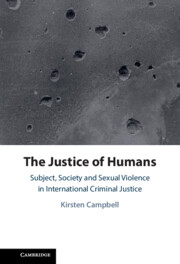Book contents
- The Justice of Humans
- The Justice of Humans
- Copyright page
- Dedication
- Contents
- Figures
- Acknowledgements
- Abbreviations
- Note on Case Citation Abbreviations
- 1 The Justice of Humans?
- Part I Subjectivity and Sociality in Contemporary International Criminal Law
- 2 The International Crime
- 3 The International Legal Subject
- 4 The International Criminal Trial
- 5 International Criminal Justice
- 6 The Global Legal Form of International Criminal Law
- Part II The Women’s Court and Transformative Gender Justice
- Bibliography
- Index
2 - The International Crime
from Part I - Subjectivity and Sociality in Contemporary International Criminal Law
Published online by Cambridge University Press: 08 December 2022
- The Justice of Humans
- The Justice of Humans
- Copyright page
- Dedication
- Contents
- Figures
- Acknowledgements
- Abbreviations
- Note on Case Citation Abbreviations
- 1 The Justice of Humans?
- Part I Subjectivity and Sociality in Contemporary International Criminal Law
- 2 The International Crime
- 3 The International Legal Subject
- 4 The International Criminal Trial
- 5 International Criminal Justice
- 6 The Global Legal Form of International Criminal Law
- Part II The Women’s Court and Transformative Gender Justice
- Bibliography
- Index
Summary
This chapter examines the first fundamental legal concept of international criminal law, the international crime, and the ideas of persons and of social relations that it expresses. The legal category of international crime determines legally defined socially injurious conduct under international law. The chapter examines the construction of this legal category by tracing the modern criminalisation of conflict-related sexual violence under international law. It then sets out international crimes of sexual violence under customary international law and examines current definitions of sexual violence offences. It analyses how sexual violence as an international crime expresses the concept of the injured person and the ‘injured public interest’ of ‘international society’ in the new legal category of the international crime. The chapter shows that sexual violence offences criminalise injury to the bodily, personal, and sexual integrity of the individual and violation of positive law and universal values of ‘international society’. However, they also reveal a set of unresolved doctrinal and conceptual problems in the legal category. These include the grounds of criminalisation, gender-based or gender-neutral offences, the sexual or violent nature of the crime, and the connection of sexual violence to illegal international violence.
Keywords
- Type
- Chapter
- Information
- The Justice of HumansSubject, Society and Sexual Violence in International Criminal Justice, pp. 29 - 64Publisher: Cambridge University PressPrint publication year: 2022

